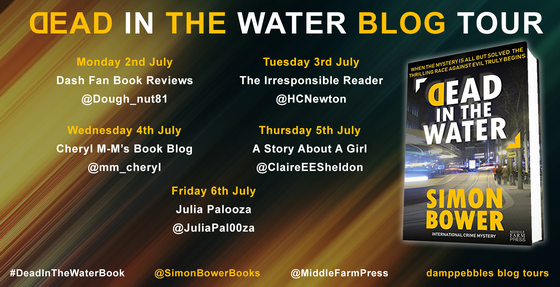 Dead in the Water
Dead in the Water
by Simon Bower
Kindle Edition, 403 pg.
Middle Farm Press, 2018
Read: June 27 – 30, 2018

I’ll be upfront with you — at the core here, there’s one decent person in this book (at least among the core eight characters), and we don’t spend that much time them. The best you can say about some of the others is that one is an almost-competent professional, a couple of others are a short course of self-improvement away from being decent people — and the rest are just horrible people. I’m not talking serial killers, stalkers, or dog abusers — not vile, evil people; just the kind of people we all would like to pretend don’t really exist. The book blurb describes some of them as “A human rights’ lawyer, an IT geek, a businessman, a waitress, a phone guy and a physiotherapist.” You could also describe them (I’ve shuffled the order to protect the identities of the guilty) as “A creep, a gold-digger, a busy-body, a drunken philanderer, an unscrupulous businessman who ignores international law, and a more successful gold-digger.”
These six people find themselves on a vacation together, all carrying their own histories and circumstances and concerns — on the whole, enjoying themselves — until some sort of calamity occurs bringing them into contact with France’s least-capable police officer, desperate to make his mark on law enforcement. Meanwhile, that one decent person is off living their life, unaware that they’re on the verge of being plunged into all the drama ensuing off the coast of France and in the mountains near Switzerland.
As I’m reading this, I get the impression I’m being awfully judgemental when it comes to these characters — and maybe I am. But that’s only in retrospect (and occasionally while reading, but that was a passing thing). While reading it, they were just “Charlie,” “Ana,” “Scott,” “Mia,” etc. Sure, you’d cringe while Scott makes another poor choice, or something, but you’re not sitting there looking down your nose at them the whole novel.
Beyond the experience of enjoying a story well told there are different things that will attract a reader to a novel. For me, usually, it’s character; frequently it’s voice or style. But sometimes — like, Dead in the Water it’ll be something else — the way the novel is put together. This story is told in a very careful, complex way — weaving multiple Point of View characters (frequently narrating the same events) and time-jumps together to tell this story. I’d accuse Bower of cheating once (and I’d be right, too) having a character show up i the middle of a sequence without any warning/indication that the character was even on the right continent. Still, it made utter sense that X would be with Y in the middle of Y’s plan, so it still worked — and the suddenness of Y’s appearance in the middle of the action was a well-timed and well-executed surprise, that guaranteed the success of story telling.
This doesn’t mean that there’s not a strong voice (or several, in this case), or that the characters were wanting — they weren’t. We have 8 well-drawn characters here, but man, you can tell this was a well-planned and (I’m guessing here) carefully finessed and re-written book to get these dominoes set up just “so.” There is a good deal of setting up — you spend the first 27% or so of the novel waiting for the crime part of this Crime Fiction to get going. Until that point, this could be a General Fiction kind of read. But then the dominoes start to fall, and initially you think that you’ve got a nice little puzzle before you (made more difficult by everyone lying about something), but then a few more fall and you realize that the novel you’re about halfway through is not at all what you thought it was.
The core of the crime part of this novel comes from a few characters trying to cut corners here and there — and then more than corners — to get ahead. Not because they feel life owes it to them, but the opportunities present themselves and these people are too weak/too opportunistic to let them slip by. There are no criminal masterminds at work here (or investigative geniuses on the other side, I should stress), just everyday folk — people you likely work, live and shop with — that decide to take the easy way.
This almost-Everyman nature of the criminals/would-be criminals in this nature leads me to my last point. I do think this novel could’ve been more effective — but not much more. The entire time, it’s never more than a couple of inches away from being a wonderful dark comedy. If Bower had just leaned into the humor just a little bit further, every twist and turn would’ve worked a little better and the novel as a whole would have been better for it. It almost succeeds as one now, it wouldn’t take much. But that’s not the direction Bower went, so we’re left with a pretty good straight crime novel.
This is a wonderfully constructed novel full of characters that are all-too believable in circumstances it’d be easy to see yourself in (assuming you had a pretty wealthy uncle and/or college friend who invited you along) in some fantastic locations throughout the world. This is a fun read that will keep you thinking through all the different things that could be happening next. Give this one a shot folks, I think you’ll be entertained.
—–





Read Irresponsibly, but please Comment Responsibly